Green Wellness Life distributes a wide array of cannabis-based goods, used primarily for health and healing. None of its wares—sold online and at a retail outlet in Caledonia, Michigan—will get you high.
“We are not sexy,” laughs Owner and Founder Brandy Palmer. “We don’t sell anything that will get you stoned or be overly fun. We joke and say we’re more for the crunchy granola crowd; we’re for people who want to focus on health.”
The cannabis plant is the source of both marijuana and hemp. Marijuana contains a large quantity of THC—the psychoactive chemical that produces a high—while hemp does not. Under U.S. law, commercial hemp, traditionally used to make rope, ship sails, clothing, and oil, can only contain a maximum of 0.3 percent THC.
Many of the products available through Green Wellness Life contain, as their key ingredients, non-THC cannabinoid compounds extracted from hemp. There are dozens of known cannabinoids, with CBD oil “being one of the most well-known,” says Palmer.
The company stocks non-psychoactive CBD oils, capsules, edibles, and topicals from various manufacturers. These hemp / CBD goods are classified as either food or supplements, not drugs. The store also sells hemp clothing accessories and CBD products for pets.
At present, CBD tinctures containing herbal extracts dissolved in a carrier oil like MCT or hemp seed oil are the company’s best-selling product. Gummies and edibles, however, are the store’s fastest-growing product categories. It only sells CBD goods that have been naturally extracted, and it has a line of zero-THC products as well.
Green Wellness Life does not claim its wares are cure-alls for every ailment, and a disclaimer on the company website from the U.S. Food and Drug Administration states as much. That said, hemp products are commonly used to reduce pain, stress, nausea, and inflammation, and to aid sleep, stabilize moods, and bolster the immune system.
The company does not manufacture its goods, which Palmer sees as a plus. As a distributor, it can be picky about the goods it selects and is not beholden to a single brand or product.
“We don’t manufacture here, which is intentional. We carry more than twenty different brands because we haven’t found a brand yet that is all things to all people. We’re really intentional about carrying a number of different lines, so we can work with people and help them find their own unique best fits,” she explains.
Green Wellness Life distributes its wares across the United States, but not internationally. While marijuana and hemp are both legal in Canada, Palmer is wary about the complex regulatory requirements that accompany cross-border sales. Global distribution will have to wait as the company focuses on increasing its U.S. market share.
On top of having a highly diversified inventory, it stands out from the competition through its commitment to education. “I want my customers to understand what they’re taking and why… Education is primary,” she asserts.
To this end, the company provides detailed information on its website and posts a weekly hemp Q and A column on its blog. Recent blog posts have focused on questions such as ‘Can CBD Go Bad?’ (The answer is yes, although “It’s more likely to degrade than spoil.”) and, ’Can I Travel with CBD?’ (Yes, you can within the United States, but it would be best to check the legal status of cannabis in other countries before trying to visit). The team also produces videos and maintains a social media presence, with the occasional live presentation on Facebook.
“Service and education are what we are truly best at. There are a lot of products and a lot of questions out there. I would love to be a resource for people that don’t know where to go. I am always going to give you straight answers. I couldn’t tell you the number of times when people have said, ‘Will this help my x, y, z?’ and my answer is, ‘I don’t know, but here are some more resources. Let’s see if it does help you,’” Palmer says.
All products sold by Green Wellness Life are certified by third-party inspectors and come with a guarantee, she adds. The company website links to batch test results for products which include capsules, drink mixes, moisturizers, tinctures, cat treats, and more. Certificates of analysis show when the batch was collected, if it contains THC, the total cannabinoids, and a multitude of other details.
This is a relatively new firm. A few years back, Palmer took a position working as a project manager for a Michigan-based manufacturer of hemp-based health products. This work sparked her interest in holistic wellness and led her to found her own company with her husband Jim in 2015. The idea was to serve as a distributor of certified hemp / CBD goods and provide information about hemp’s healing benefits to customers.
At first, the fledgling company did not have a physical location. Products were stored off-site, and Palmer arranged delivery to customers.
“I figured out pretty quickly that I didn’t like [this arrangement]. A customer would call and say, ‘This bottle changed,’ or ‘This is different than what’s on your website,’ and I didn’t have the products in front of me to be able to confirm or deny. I decided to start warehousing on my own,” she recalls.
A “little, teeny space,” comprising six hundred square feet, was rented to accommodate an office and warehouse. The company began doing its own shipping, but then people began showing up at the office to purchase products in person. Given this development, Palmer decided to open a brick-and-mortar outlet in 2017 to augment online sales.
Last year, the company launched a second venture called Grow Green Wellness, with a focus on indoor plant cultivation. The online business offers garden accessories, grow tents, plant nutrients, containers, insect repellent, and the like. Customers vexed by Michigan’s short outdoor growing season can now raise “whatever type of plants they’d like to grow,” year-round, she says.
The firm had a staff of three for a time, but is currently “a two-woman operation,” and as a small business, it is both flexible and highly responsive to market trends. However, Palmer is cognizant of certain economic realities in the hemp / CBD space. While she “hopes there’s room for both,” large and small suppliers in the cannabis sector, Green Wellness Life tends to favor products from large firms. Bigger companies have the personnel and technical ability to “offer a consistent quality product,” she explains.
Smaller ones might be staffed by people who are “passionate about the plant,” but are often incapable of meeting her stringent quality and marketing benchmarks. “When you’re selling online and looking for a nationwide audience, you need to have consistency,” Palmer notes.
For all that, this remains a very community-oriented company. The firm supports local charities including animal shelters and an organization that helps teenage mothers. Green Wellness Life provides workers $500 a year to donate to the charity of their choice.
It also offers an ‘Eliminate the Stigma’ scholarship, a unique initiative in which participants explain “what CBD means to them or how it’s impacted their life. It’s pretty humbling to read some of these stories and poetry and see the work that’s gone into art projects and all these people explaining what it’s meant to them,” she says.
The winner of the Eliminate the Stigma scholarship receives $1,000 and recognition from Green Wellness Life.
In the future, Palmer plans to launch a subscription service and expand the company’s cannabinoid offerings. Not counting the COVID virus—which briefly shuttered the retail outlet—she says her biggest challenge comes from the legal marijuana market. Michigan has joined a series of other states that have legalized recreational pot, a move which has impacted sales at hemp / cannabinoid outlets such as this.
“I firmly believe there is a place for both hemp and marijuana and they both can have benefits for clients, but as we’ve seen the growth of [legal] recreational marijuana, we’ve seen a decline in the hemp-based industry around here,” she says.
Palmer, however, has no plans to expand into the marijuana market in part because “my community at this time would not allow it, and I don’t want to leave this community. This is where my family is and where I want to have my business.”
Five years down the road, “I would like to have five to six employees, so we can be doing larger-scale education, marketing, and media but other than that, I like what we’ve got going on. I don’t want to change our branding. I don’t want to change how we do business. I want to offer the same exceptional level of service, but on a larger scale,” she affirms.






